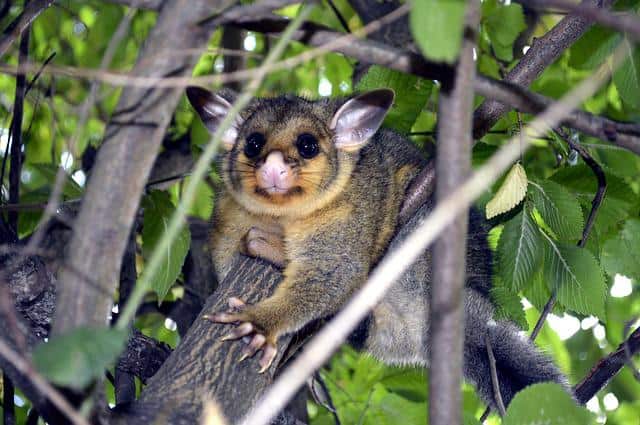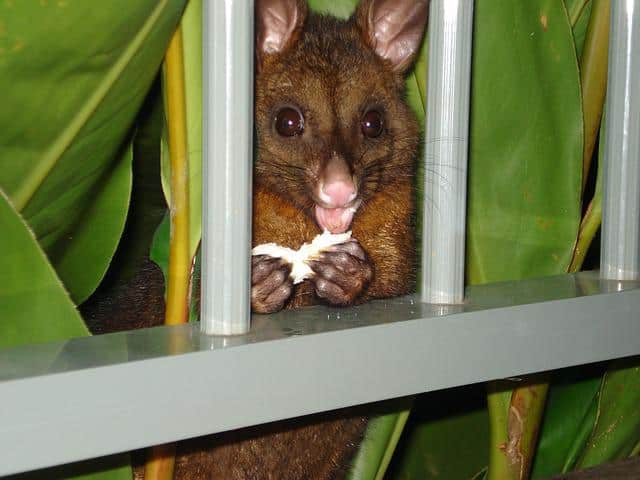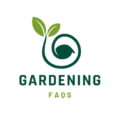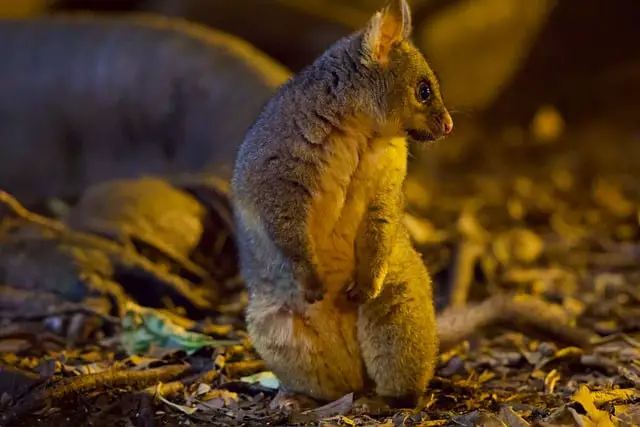Possums are nocturnal marsupials that may appear cute and cuddly to many people but can cause a significant amount of damage to gardens and fruit trees. If you are noticing missing and damaged fruit trees you may be asking yourself, do possums eat oranges?
Possums are scavengers and are also known to rummage in garbage and eat just about anything a human will eat. They will also eat a wide variety of fruits and vegetables. Possums will even eat oranges.
Though they are often seen as a nuisance, possums are also essential for the health of ecosystems, aiding in the dispersal of seeds and providing food for other animals.
Below we look at some of the habits of possums, what their diet consists of, and ways to prevent them from causing damage to your fruit trees and vegetable gardens.
Where Do Possums Live?

Possums are considered native to America, Australia, Indonesia, and New Zealand. They adapt to their surroundings and can live in many areas including cities and the countryside.
Much of their natural habitat has forced them to live in the same areas as humans. Possums are nocturnal. They sleep during the day and are more active at night. Possums are scavengers and feed at night to minimize their contact with people.
Possums can live in urban or rural areas. They prefer to live in hollows created in trees. In urban areas, they have to adapt to living in roof spaces, attics, or even basements of homes. There is most likely a possum population near you as they are growing in numbers.
Do Possums Eat Oranges?
Possums are known to eat oranges. The vitamin C found in oranges can be beneficial to a possum’s diet. Oranges are high in sugar content and can make a possum sick if they eat too many of them.
They prefer over-ripe fruit that is found on the ground but will also steal the fruit directly off the trees. Possums can cause significant damage to fruit trees.
What Else Do Possums Eat?

Due to a possum’s active life, they can eat plenty of food. They are scavengers and will eat anything they can find. Anything edible to a human will also be edible to possums. This includes fruits or vegetables found in your trees and gardens. They can also eat the leaves or flowers of the plants and trees.
In addition to oranges, possums will eat a variety of fruits including apples, grapes, bananas, berries, and melons. Possums will also seek out and eat a variety of vegetables.
Carrots, celery, peas, potatoes, celery, and carrots will all be found in a possums diet. Some possum will prefer crunchy foods, and others will seek out softer fruits and vegetables.
Possums will also be a menace to chickens. They will seek out and eat the chicken eggs. Possums will also consume any seeds, slugs, and even worms they will find.
Do Possums Eat From The Garbage?
Possums will often eat from the garbage. They are not picky eaters and any leftover food easily found in garbage cans is a perfect meal opportunity for a possum.
Eating from garbage could lead to health problems for humans, possums, and even other animals. Utilizing a trash can that can be secured with a tight lid will deter possums from rummaging through and eating from your trash cans.
How To Prevent Possums From Eating From Your Garden

There are a few ways that can help deter a possum from eating from your orange tree and even your garden. The best choice would be to add a physical barrier such as netting or a fence around your tree or garden.
It should be at least 3 feet in height to prevent the possum from being able to climb over it to reach your fruits and vegetables.
Possums fear dogs and other larger animals they could see as predators. Adding hairs from a dog or other large animal to your garden could help to keep the possum away from your garden and orange trees. The smell of the larger animals will frighten the possum and send him elsewhere to look for food.
Mothballs can also be effective in keeping possums and other animals out of your garden, but be leery of using them. Some areas have restricted or banned the use of mothballs in outdoor areas.
They are considered pesticides and misuse can contaminate the ground or water when used outdoors. Check your local laws before using mothballs to deter possums in outdoor settings.
More on this category: Can Spider Mites Live in Carpet?
Conclusion
Possums are nocturnal animals. They have adapted to live alongside humans in rural and urban environments. They are scavengers and will seek out a variety of fruits and vegetables including oranges on the ground or picked off the trees.
Putting up physical barriers to your garden or spreading animal hair will deter them from feeding in your garden. Securing your garbage will help eliminate possums scavenging in your trash. It will send them in other directions to search for food.
Frequently Asked Questions
What do possums eat?
Possums are scavengers and seek out a variety of vegetables and fruits. They will eat fruits such as oranges, bananas, and grapes. They also enjoy vegetables such as carrots, celery, peas, and potatoes. They will even eat seeds, nuts, or leaves.
Do raccoons eat oranges?
Raccoons are scavengers and are known to eat a variety of fruits and vegetables including oranges. Raccoons can peel an orange as a human would and leave the peels on the ground near your tree when feeding on the oranges.
What food can I leave out for possums?
Possums will eat almost any food a human can eat. They will eat a variety of vegetables and fruit. Possums will also eat cat food left out overnight. Some possums will prefer hard vegetables or fruits, while others prefer soft foods. Possums will also eat slugs, worms, and even seeds.
Is it OK to feed possums cat food?
Possums will eat almost anything a human will. Feeding a pet possum cat food will help provide the vitamins and nutrients they need. Over the long term, cat food will not provide the calcium your possum needs. Lack of calcium in possums can lead to bone disease.

Hey, I’m Lisa and I’ve been an avid gardener for over 30 years. I love writing, talking and living in the garden! Feel free to connect with me on my socials below

